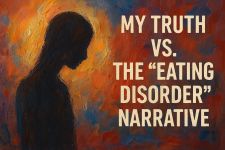My journey through the world of eating disorder treatment has been a complex one, marked by moments where I felt profoundly marginalized and dismissed. While I wouldn’t have used those exact words at the time, reflecting now, that’s precisely how it felt. I experienced what I can only describe as emotional and psychological violence when my deepest truths about my body and my recovery were simply brushed aside.
For years, I engaged in behaviours that were almost indistinguishable from binge eating disorder (BED). However, I now understand that my struggle wasn’t purely BED; it was rooted in something distinct: junk food addiction and processed food addiction. The diagnostic criteria to differentiate these two weren’t widely accessible or used when I first sought help, making it incredibly difficult to find the right support.
The Eating Disorder Treatment Centre Experience: A Deep Dive into Misunderstanding
I once spent a month in an eating disorder treatment centre that aimed to treat all eating disorders under one roof. We had individuals with anorexia, ARFID, bulimia, and many diagnosed with binge eating disorder. While I’m certain the BED diagnosis fit for some, it did not fit for me.
My personal truth was this: I had achieved incredible success through a whole food plant-based (WFPB) way of eating for six months to a year. During this period, I abstained from sugar, oil, and most ultra-processed foods. I felt “amazing,” my “food noise had vanished,” and I was in peak physical and mental health. This was everything I wanted for myself in addiction recovery.
However, when I shared this in the treatment facility, it was dismissed. My successful approach was labelled as “restrictive eating” or even “orthorexia”. Desperate for help and in pain, I suspended my own truth because these “professionals” told me I was wrong. In hindsight, this was incredibly damaging, setting my recovery back for months, if not years. The advice I received – “all foods fit” and “food neutrality” – was precisely the opposite of what I needed to learn for my specific challenge.
The Crucial Distinction: Food Addiction vs. Binge Eating Disorder
This experience highlighted a critical misunderstanding that continues to plague the treatment community: the difference between food addiction and binge eating disorder.
• Binge Eating Disorder (BED), as I understand it, often stems from a history of restrictive eating disorders like anorexia or bulimia. It carries an underlying belief that some foods are “bad,” immoral, or unethical, and that eating them is wrong.
• Food Addiction, particularly to junk and processed foods, is a different beast entirely. For me, it’s about recognizing that ultra-processed food isn’t true nourishment; it’s a product. These items are dreamt up by food scientists with the sole intention of creating profit, designed to make you consume more and change your state, much like other substances. I don’t see them as “bad” or “immoral”; I see them as not food at all, no more food than marijuana is air.
I know in my heart that I feel better when I don’t eat these specific foods. My food noise drops, and I function optimally. This isn’t about restriction driven by a fear of “bad” foods; it’s about recognizing that certain “products” interfere with my well-being.
A Recent Reminder of the Dismissal
Just this spring, I had another unsettling encounter during a breathwork training. Partnered with a therapist specializing in eating disorders, I expressed my intention to “unravel my food addiction”. Her dismissive response, implying that “people who use that terminology” were simply using a different word for something she already understood, left me feeling incredibly upset and unheard. It reinforced the pervasive lack of understanding.
Trust Your Truth: A Message to Fellow Travellers
If you’re reading this and recognize your own experience, please know this: if you know in your heart that cutting out certain foods is what you need for your optimal health, do not let anybody convince you otherwise.
Of course, if you have a history of anorexia or severe restrictive dieting, it’s always crucial to seek professional guidance. But if you’re dealing with food addiction, you know you’re still getting enough calories and nutrients, and you feel that abstaining from specific ultra-processed foods is essential for your well-being, you deserve to have your truth acknowledged.
It is incredibly important to work with a professional who genuinely understands and can differentiate between binge eating disorder and food addiction, recognizing both as valid conditions and able to run through proper diagnostic criteria. Your recovery journey is uniquely yours, and your internal wisdom about your body’s needs is invaluable.

